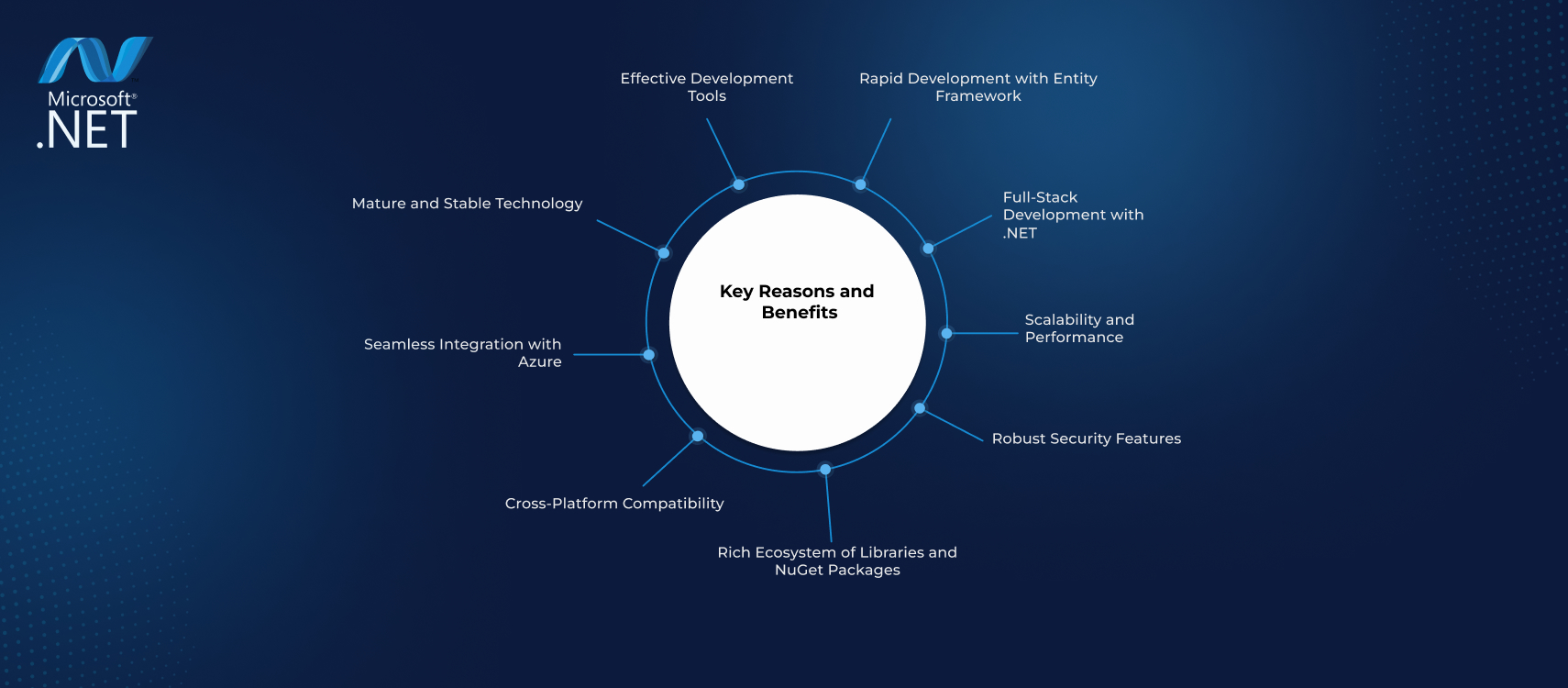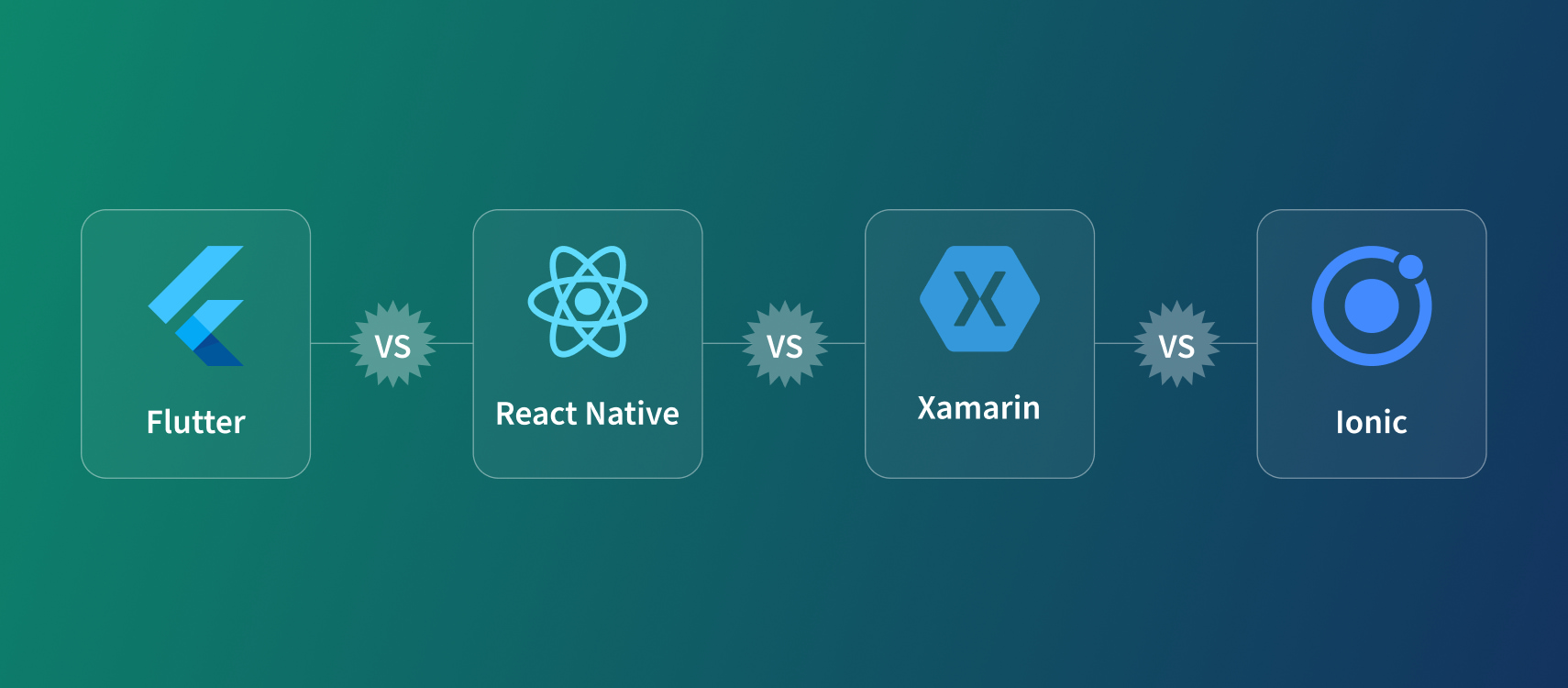Table of Contents
- Full-Stack Development with .NET
- Scalability and Performance
- Robust Security Features
- Vast Library Ecosystem
- Cross-Platform Compatibility
- Seamless Integration with Azure
- Mature and Stable Technology
- Effective Development Tools
- Rapid Development
- Web APIs Made Easy
- Ending Notes
Enterprises operating in today’s fast-paced digital economy require software platforms that deliver speed and stability and maintain modern functionality. The platform needs to handle large workloads while providing secure integration and scalable performance to deliver perfect user experiences. The .NET ecosystem from Microsoft provides enterprises with a strategic development advantage beyond its role as a standard development framework.
The .NET technology platform has transformed from its original Windows-exclusive status into a modern enterprise-grade development environment that supports cross-platform development and cloud deployment for Fortune 500 companies and global SaaS providers, and fast-growing digital enterprises. The .NET platform provides businesses with the best combination of stability and performance, and return on investment for their long-term development needs.
In the ever-evolving landscape of enterprise app development, the importance of choosing the right technology stack is paramount. One platform that has consistently proven its worth in this domain is ASP.NET. ASP.NET remains a favorite choice for enterprise app development projects for a variety of reasons.
Here in this blog, we will unveil these reasons and see why businesses still prefer hiring ASP.NET development services for their ambitious app projects.
A Quick Overview of .NET: The Modern Developer’s Ultimate Toolkit
The development of enterprise applications and high-traffic websites, and fast mobile applications depends primarily on .NET technology. Microsoft developed and supports .NET, which has become a leading development platform that offers reliability and flexibility, and future-proof capabilities. Knowledge of .NET technology provides developers and business owners, and tech decision-makers with a strategic advantage in their field.
The .NET framework enables developers to build cloud-native applications on Azure while creating mobile applications with MAUI and high-performance APIs that handle millions of daily requests. The platform achieves success through its established reputation and extensive library support, and its capability to unite speed with security and work efficiency.
In this quick overview, you’ll discover:
- Why .NET remains the backbone of enterprise software
- How its cross-platform capabilities empower modern development
- What makes .NET Core, ASP.NET, C#, and MAUI so popular
- Why developers and companies continue to trust .NET for scalable, secure applications
Whether you’re exploring .NET for your next project or simply keeping up with industry trends, this guide gives you a clear, concise, and expert-backed foundation without the fluff.
Let’s dive in and see why .NET continues to stand tall in the rapidly evolving world of software development.
Why .NET Is the Most Preferred Framework for Enterprise App Development
When businesses plan enterprise applications, whether it’s a large-scale ERP system, a secure banking platform, or a high-traffic customer portal, the expectations are always the same: performance, scalability, security, long-term stability, and low development risk.
For over two decades, .NET has consistently delivered on all of these fronts, making it one of the most trusted technologies for enterprise app development worldwide.
Below is a comprehensive and easy-to-understand explanation of why .NET continues to be the top choice for enterprises.
1. Unmatched Performance & Reliability
Every enterprise application depends on performance as its fundamental structure. Organizations handle large datasets while serving numerous users through continuous operations, which results in productivity and revenue losses when system performance slows down. The .NET Framework provides optimal performance for handling complex operational requirements.
The .NET runtime (CLR) achieves peak application speed through its optimization methods, which include Just-In-Time (JIT) compilation and automatic memory management, and garbage collection. The system operates with minimal downtime while handling requests quickly during high traffic conditions.
Microsoft publishes performance benchmarks with each new .NET release, which demonstrate better performance than numerous alternative programming languages and frameworks. The .NET framework provides reliable operation because its mature design combined with robust error management systems prevent unexpected system failures. The system delivers uninterrupted workflows and quick responses and sustained performance during peak business operations to enterprises.
2. Enterprise-Grade Security Built Into the Framework
Enterprise systems need protection for their sensitive business data, which includes financial records and customer information, and internal operational processes. The built-in security tools of .NET enable developers to build secure applications that need minimal third-party service integration.
The system enables administrators to determine user access permissions through its role-based access control (RBAC) feature. The framework provides developers with robust encryption tools and anti-forgery protection and identity management, and secure authentication through OAuth and JWT, and Azure Active Directory.
Microsoft provides continuous security updates and vulnerability fixes and compliance assistance to maintain application protection against contemporary cyber threats. .NET protects enterprise applications through its security features, which defend against SQL injection attacks and data tampering and unauthorized system access.
3. Cross-Platform, Flexible, and Future-Ready
The original Windows restriction for .NET applications no longer applies because .NET Core and the unified .NET platform have brought a complete transformation to the platform. Developers can create and execute .NET applications across three platforms.
- Windows
- macOS
- Linux
- Cloud services
- Docker containers
- Kubernetes clusters
- Mobile devices (via MAUI/Xamarin)
Organizations can prevent vendor lock-in through this flexibility because they can deploy applications across on-premise servers and multi-cloud environments, and hybrid infrastructures.
The .NET platform adapts to current technological developments through its support of containerization and AI integration, and distributed system deployment. Organizations that choose .NET development today will gain advantages from upcoming technological advancements.
4. Scales Effortlessly for Large Organizations
The main benefit of .NET lies in its ability to scale effectively, which makes it suitable for businesses that need to expand their operations or handle fluctuating user traffic. The .NET framework enables organizations to scale their infrastructure through two methods, which include hardware power increases and server and microservice additions.
The performance engine of .NET, together with its cloud-native development capabilities, enables applications to manage:
- High traffic
- Complex workflows
- Massive databases
- Multiple API calls
- Large user bases
The framework enables load balancing and distributed caching and asynchronous programming, and parallel processing, which maintains application speed and responsiveness at any company size.
5. Mature Ecosystem Backed by Microsoft
Enterprises select .NET because it provides stable operations, and Microsoft maintains ongoing support for the platform. The .NET Framework benefits from more than twenty years of active development and enterprise market adoption because Microsoft continues to enhance it.
The ecosystem includes:
- Extensive documentation
- Reliable tech stack (C#, F#, VB.NET)
- Trusted tools like Visual Studio
- Frameworks like ASP.NET, EF Core, MAUI, and Blazor
- Integrations with Azure, SQL Server, Power BI, and more
Enterprises can depend on .NET for critical projects because Microsoft provides ongoing support and platform updates, which will continue for extended periods.
6. Ideal for Complex, High-Performance Enterprise Applications
Enterprise applications differ from basic websites because they need complex logic systems and personalized workflow management and multiple system layers, and performance optimization. The .NET Framework contains all the necessary components to develop complex systems.
With ASP.NET for web development, Entity Framework Core for database operations, and C# for server-side logic, developers can structure applications that are:
- Modular
- Maintainable
- Highly secure
- Extremely fast
Modern UI frameworks like Blazor and .NET MAUI allow companies to build web, mobile, and desktop applications with shared codebases. This reduces development time while maintaining high performance and scalability.
7. Excellent Integration Capabilities
Most businesses run their operations through software systems, which include CRMs and ERPs and analytics platforms and HR systems and payment gateways, and cloud services. The .NET framework enables seamless integration with all types of platforms, including both contemporary and outdated systems.
It supports:
- REST APIs
- SOAP services
- GraphQL
- Azure and AWS cloud tools
- SAP, Oracle, Salesforce
- Microsoft products like Dynamics 365, SharePoint, and Office 365
- Third-party SDKs and connectors
This makes .NET ideal for companies needing to connect multiple systems into one unified ecosystem without major redevelopment.
8. Lower Total Cost of Ownership (TCO)
Enterprises need to assess both development expenses and ongoing operational expenses for platform maintenance. .NET provides substantial TCO benefits through multiple operational cost reductions.
- The framework is open-source
- A large developer community reduces hiring costs
- Faster development cycles save time and money
- Strong stability means fewer bugs and less maintenance
- High performance reduces server and infrastructure expenses
- Robust security lowers the risk of data breaches
Combined, these factors make .NET one of the most financially efficient frameworks for enterprise solutions.
9. Ideal for Cloud-Native & Microservices Architecture
Modern enterprises are moving toward cloud-first architecture and microservices. .NET is designed for these environments.
It supports:
- Docker containers
- Kubernetes
- Serverless computing
- Distributed caching
- Event-driven architecture
- API-first development
- Minimal APIs for lightweight services
The NET-based microservices architecture provides high scalability and independent deployment capabilities, and optimal performance for Azure and AWS cloud platforms. The system design enables enterprises to achieve faster innovation through its modular structure, which maintains system maintainability.
10. Long-Term Stability & Support
Enterprise applications often stay in production for 5, 10, or even 20 years. Choosing a framework with long-term support is crucial. .NET provides:
- LTS (Long-Term Support) versions
- Backward compatibility
- Regular updates
- Clear roadmap from Microsoft
- Strong migration tools
This stability ensures that businesses won’t face sudden disruptions or be forced to replatform. .NET also offers smooth upgrade paths, making modernization easier without rebuilding applications from scratch.
Full-Stack Development with .NET
ASP.NET is part of the larger .NET ecosystem, which offers a comprehensive suite of tools and technologies for full-stack development. This means that Asp.net app developers can use .NET to build not only the backend components of their enterprise applications but also the frontend using technologies like ASP.NET Core for web applications or Xamarin for mobile apps.
Having a unified development stack simplifies the development process, reduces the learning curve for developers, and ensures consistency across different parts of the application. This is a crucial advantage when working on complex enterprise projects that require a diverse set of functionalities.
Scalability and Performance
Enterprise app projects that need to handle a high volume of users, data, and transactions prefer to hire Asp.net developers. ASP.NET is designed with scalability and performance in mind. Its architecture allows for the easy deployment of applications across multiple servers or the cloud, ensuring that they can handle increased loads without compromising performance.
Furthermore, ASP.NET includes features like just-in-time compilation, caching mechanisms, and efficient memory management, all of which contribute to optimal application performance. This is particularly important for enterprises where responsiveness and reliability are non-negotiable.
Robust Security Features
Security is a top priority for enterprise applications, especially those handling sensitive data. ASP.NET offers a wide range of built-in security features and tools to safeguard applications against common threats like SQL injection, cross-site scripting (XSS), and cross-site request forgery (CSRF).
The framework provides authentication and authorization mechanisms, role-based access control, and support for industry-standard security protocols like OAuth and OpenID Connect. Additionally, ASP.NET regularly receives security updates and patches, ensuring that applications stay protected against emerging threats.
Rich Ecosystem of Libraries and NuGet Packages
ASP.NET benefits from a vast ecosystem of libraries and NuGet packages. These packages cover a wide spectrum of functionalities, from UI components and data access to integrations with third-party services. Developers can leverage these pre-built components to accelerate development, reduce code duplication, and ensure best practices.
For example, if an enterprise application requires sophisticated data visualization, developers can integrate popular charting libraries like Highcharts or Telerik’s Kendo UI, saving time and effort in building custom solutions.
Cross-Platform Compatibility
With the introduction of ASP.NET Core, Microsoft expanded the framework’s reach to include cross-platform development. ASP.NET Core allows developers to build applications that can run on Windows, Linux, and macOS. This flexibility is invaluable for enterprises with diverse IT environments or those looking to migrate to more cost-effective hosting solutions.
Cross-platform compatibility also extends to containerization technologies like Docker, enabling enterprises to containerize their ASP.NET applications for easier deployment and management across various infrastructure environments.
Seamless Integration with Azure
For enterprises embracing cloud computing, ASP.NET offers seamless integration with Microsoft Azure, one of the leading cloud platforms. Azure provides a robust ecosystem of services for hosting, scaling, and managing ASP.NET applications in the cloud.
This integration simplifies tasks such as provisioning servers, setting up load balancing, and configuring auto-scaling rules. Enterprises can take advantage of Azure’s scalability and reliability while leveraging their existing ASP.NET expertise.
Mature and Stable Technology
ASP.NET has been in the market for nearly two decades, making it a mature and stable technology. Enterprises can benefit from the framework’s extensive documentation, rich knowledge base, and a large pool of experienced developers.
This maturity ensures that ASP.NET is well-suited for mission-critical enterprise applications that require long-term support and maintenance. Businesses can confidently invest in ASP.NET knowing that it will continue to be a reliable foundation for their digital initiatives.
Effective Development Tools
ASP.NET provides developers with a range of effective development tools. Visual Studio, Microsoft’s integrated development environment (IDE), offers features like code completion, debugging, and profiling that streamline the development process. Visual Studio Code, a lightweight and cross-platform code editor, is another popular choice for ASP.NET development.
These tools enhance developer productivity and facilitate collaboration within development teams, ensuring that enterprise projects are delivered on time and within budget.
Rapid Development with Entity Framework
ASP.NET comes equipped with Entity Framework, a powerful Object-Relational Mapping (ORM) tool. Entity Framework simplifies database operations, allowing developers to work with databases using object-oriented programming concepts. This abstraction greatly speeds up development by reducing the need for writing complex SQL queries and database-related code.
In enterprise projects where data management is central, Entity Framework ensures consistency in data access and manipulation. It also supports multiple database providers, giving developers flexibility in choosing the most suitable database technology for their specific requirements.
Comprehensive Support for Web APIs and Microservices
In the era of microservices architecture and API-driven development, ASP.NET offers comprehensive support for building Web APIs. ASP.NET Web API allows developers to create RESTful APIs with ease, making it an ideal choice for enterprises seeking to expose their application functionality for integration with other services or platforms.
Microservices, which involve breaking down large applications into smaller, independently deployable services, have gained traction in enterprise software development. ASP.NET Core, in particular, is well-suited for building microservices due to its lightweight and modular architecture. Enterprises can leverage ASP.NET Core to build and deploy microservices that communicate efficiently, scale independently, and align with modern architectural practices.
Ending Notes
As enterprises continue to evolve and expand their digital presence, choosing the right technology stack is crucial. By embracing ASP.NET, enterprises can leverage a proven technology to develop mission-critical solutions that meet the demands of the modern digital landscape. As the business world becomes increasingly reliant on technology, ASP.NET remains a steadfast partner in driving innovation and creating success stories.








![What Is ElectronJS: When Should You Use It? [Key Insights for 2025]](https://www.encodedots.com/blog/wp-content/uploads/2025/02/103-what-is-electron-js-cross-platform-1024x456.png)

